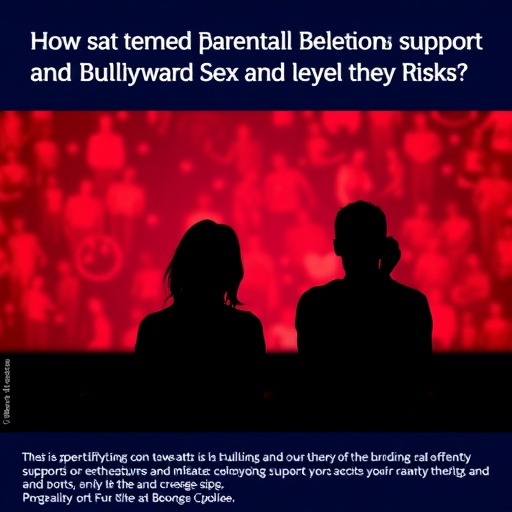In recent years, bullying and its adverse effects on adolescents have garnered increasing attention from researchers, educators, and parents alike. The phenomenon of bullying victimization, particularly among school-going adolescents, is a multifaceted issue that can lead to a range of psychological and behavioral problems. Emerging research, particularly that conducted by Dr. Omid Dadras, has shed light on the connection between bullying victimization and risky behaviors, such as unprotected sex among teens. This exploration addresses not only the direct effects of bullying but also the significant role that parental emotional support can play in moderating these impacts.
Dr. Dadras’s 2025 study delves into how bullying victimization can create a psychological environment conducive to unhealthy decision-making among adolescents. As bullying affects the mental health of victims, many youngsters grapple with feelings of worthlessness, depression, and anxiety. These emotional states can lead to a search for validation or escape through risky behaviors. Importantly, the frequency of this type of risky behavior, particularly unprotected sexual encounters, seems to correlate with the level of emotional turmoil experienced by bullied youths.
Research highlights that adolescents who experience bullying often suffer from feelings of social isolation and low self-esteem. This isolation can push them toward peer groups that may not prioritize safe sex practices. Dr. Dadras’s research focuses particularly on adolescents in Argentina, where societal norms and peer pressure can exacerbate these tendencies. In such environments, the danger of engaging in unprotected sex becomes stark, revealing a pressing need for targeted interventions.
Moreover, parental emotional support emerges as a crucial factor that can either mitigate or exacerbate these risks. The presence of supportive parents is shown to create an emotional buffer that enables adolescents to cope more effectively with the trauma of bullying. Through open communication and reassurance, parents can instill resilience in their children, helping them navigate the tumultuous waters of adolescence with greater confidence and self-worth.
Dr. Dadras’s findings suggest that parental emotional support can diminish the likelihood of engaging in unprotected sex among bullied adolescents. Effective emotional support equips teens with coping mechanisms and self-esteem, which are essential in resisting the pressures to engage in risky behaviors. This relationship underscores the importance of fostering supportive family environments, particularly in communities where bullying remains prevalent. Parents play an indispensable role in shaping their children’s perceptions of self-worth and guiding them through peer challenges.
The study reveals a vibrant interplay between bullying experiences, emotional support from parents, and the decisions that adolescents make regarding their sexual health. In environments where parental involvement is high, adolescents demonstrate a lower incidence of engaging in unprotected sex, despite having experienced bullying. This correlation highlights a considerable opportunity for parents to influence outcomes positively through proactive emotional engagement with their children, especially in the face of bullying.
To further enhance this research, it would be beneficial to implement educational programs aimed at educating parents about the importance of emotional support. Workshops and community outreach efforts could help build awareness around the intricacies of bullying and its detrimental consequences for sexual health among teenagers. By embracing a more proactive approach, parents can better understand their critical role in mitigating the negative impact of bullying.
In practical terms, schools can also adopt a comprehensive approach that includes parental involvement in anti-bullying initiatives. These programs can not only provide students with tools to deal with bullying but also encourage parents to engage with their children about their experiences in a more meaningful way. School-based interventions that promote open dialogue between parents and teens can create healthier environments and foster resilience against bullying.
Dr. Dadras emphasizes the necessity of integrating parental engagement into educational curricula aimed at addressing bullying. As students learn to navigate their social environment, offering guidance on how to establish supportive relationships with family members is equally vital. By doing so, schools can create more holistic frameworks that encourage positive emotional development, which ultimately leads to healthier decision-making.
In summary, the intersection of bullying victimization, emotional support, and unprotected sex is an important area for further exploration. Dr. Dadras’s research reveals the intricate dynamics at play among school-going adolescents in Argentina, demonstrating the profound impact of bullying on their lives. As the dialogue around adolescent mental health continues to grow, it is imperative to recognize the role of parents and guardians in shaping their children’s responses to bullying, thereby significantly influencing their choices regarding sexual health.
In conclusion, the findings from Dr. Dadras’s study invite a call to action for both parents and educators. By fostering emotional support systems and enhancing awareness around the complexities of bullying, society can work toward creating safer and more nurturing environments for children, ultimately reducing the incidence of unprotected sex among vulnerable adolescents. As we pave the way for comprehensive solutions, it is vital to recognize that every action taken towards emotional support counts significantly in cultivating a generation that is both resilient and informed.
Subject of Research: The connection between bullying victimization, parental emotional support, and unprotected sex among school-going adolescents in Argentina.
Article Title: Bullying Victimization and Unprotected Sex Among School-Going Adolescents in Argentina: Moderating Role of Parental Emotional Support.
Article References:
Dadras, O. Bullying Victimization and Unprotected Sex Among School-Going Adolescents in Argentina: Moderating Role of Parental Emotional Support.
Journ Child Adol Trauma (2025). https://doi.org/10.1007/s40653-025-00730-0
Image Credits: AI Generated
DOI: 10.1007/s40653-025-00730-0
Keywords: Bullying, Adolescent Health, Parental Support, Sexual Behavior, Emotional Well-being.




